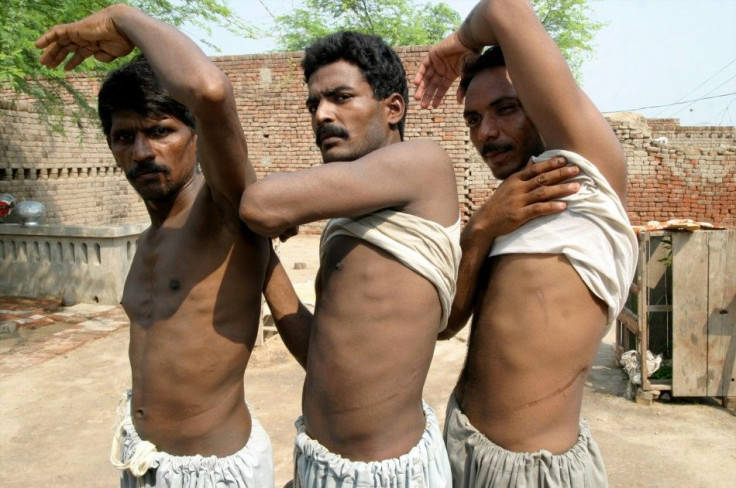In a Poor Economy, Black Market Organ Trade is a Booming Business

Economic hardship is the single most pertinent global issue today -- as exemplified by the ongoing protests around the world -- and in impoverished nations, some people have had to go to extremes to get out of debt: selling their organs.
Selling organs on the black market is an not uncommon practice in India, China and Bangladesh. The issue was brought to mainstream attention in 2008, the same year that Indian police busted a ring of doctors who sold as many as 500 kidneys over a decade to rich foreigners, but media coverage has since died down.
But, it is still a serious issue, especially in countries that teeter between the third and first world. In these places, impoverished and starving people turn to middlemen doctors who then sell their body parts to the county's elite, or people in the West who have been on long organ waiting lists.
The Global Post's Sebastian Strangio talked to one Bangladeshi who was promised 300,000 taka (about $4,000) by a black market organ dealer in exchange for 60 percent of his liver. After a 10 hour operation, the man, Mehdi Hasan, found himself stranded in a hospital, the dealer having left without paying him for the organ.
Many of those who sell their organs in Bangladesh do so to pay off loans when micro-financing projects don't reach a profitable fruition.
I heard from the neighbors that if you donate a kidney you can make some money, a woman named Mahmuda Akter told Strangio. I feel like I had to sell it because I was under too much pressure.
It should be remembered that this is not a problem isolated to Asia. The American urban legend of waking up kidney-less in a bathtub full of ice was essentially legitimized in 2009, when police broke up a ring of black-market organ dealers in New Jersey that involved Orthodox rabbis and elected officials.
In the scheme, rabbis allegedly bought kidneys from vulnerable Israelis for $10,000, which were then resold to Americans for upwards of $160,000. The practice had been going on for a decade.
Illegal organ sales happen all over the world. A person in Moldova stands to make between $2,500 and $3,000 for kidneys that then get sold for up to ten times that amount, according to Havoscope data. Worldwide, it is a $75 million per year industry.
The most recent arrests related to the organ trade happened in China, where this month three doctors in Bazhou city were interrupted mid-operation by a team of police. China, like nearly every country in the world, has a disproportionately large ratio of people waiting for transplants and legitimate organ donors. There are currently 1.5 million people waiting for ograns, but only 10,000 registered donors in the country.
China is also notorious for harvesting organs from dead prisoners. The practice is not legal, of course, expect in a very few cases, the country's foreign ministry told the BBC. But with around 2,000 people executed each year, prison officials can stand to make a significant profit.
Other countries are dealing with the problem in different ways.
In 1988, Iran made matters far less complicated. It was the first and only country to simply legalize the sale of organs. So far, the program has been a success.
Currently, Iran has no renal transplant waiting lists, and more than 50 percent of patients with ESRD (end-stage kidney disease) in the country are living with a functioning graft, Dr. Ahad J. Ghods said in the Clinical Journal of the American Society of Nephtology.
By legalizing the human organ trade, Iran is able to regulate the industry and make it safe. Certified doctors can perform the operations, and with government support, charity organizations make compatibility matches. The creation of a legitimate industry also has the potential to add legitimate jobs.
(Does this argument sound familiar? It is the one most used when defending the legalization of prostitution.)
Donors in Iran make an average of $1,200 and get temporary health insurance from the government, according to The Wall Street Journal.
Singapore has also discussed the possibility of opening up the legal donor market, with some government officials suggesting that donors about make up to $50,000. In Singapore, citizens are also de jure organ donors upon death, unless they choose to opt-out for the mandatory program.
Most scholars agree that the best way to stop the illegal trade of human organs is to increase the number of voluntary donors. That will limit the number of people willing to pay huge sums, as well as save more lives per year. But, because of the way the black market is structured now, that's going to be difficult in places like India and Bangladesh.
It's going to be extremely hard to get a family to donate because they think it's some big scam, The Multi Organ Harvesting Aid Network's head doctor Sunil Shroff told Time Magazine. That's the wider damage this type of story does.
© Copyright IBTimes 2024. All rights reserved.





















